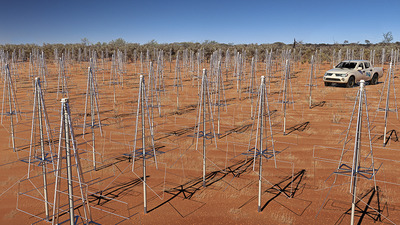WA govt funds five more years of radioastronomy
WA Premier Colin Barnett has announced a $26m investment in the International Centre for Radio Astronomy Research (ICRAR), based in Perth. The commitment is part of the state’s wider $96m investment in radioastronomy.
Considered one of the top 10 radioastronomy centres in the world, ICRAR played an important role in attracting part of the world’s biggest telescope, the Square Kilometre Array (SKA), to WA. The centre will lead the state’s involvement in the project.

ICRAR was launched by Curtin University and The University of Western Australia in 2009, with initial support for five years from the WA Government and joint venture partners. The new funding will allow ICRAR’s local activities in science and with industry to continue until 2019, as well as expanding the high-tech and scientific capabilities of the state. Earlier this year, ICRAR received almost $5m as part of a $19m federal government funding package for SKA preparatory work.
ICRAR Director Professor Peter Quinn said ICRAR has already created opportunities for local industry of over $4.8m to date and that industry engagement and driving innovation were one of three priorities for the new state funding.
“With this support from the state government, ICRAR will continue our international leadership in astronomy, new-generation radio telescope engineering, and advanced supercomputing and software systems,” said Prof Quinn.
“ICRAR will be a major part of pre-construction work for the Square Kilometre Array, building on the skill and knowledge we gained from the Murchison Widefield Array,” said Prof Quinn, referring to the first SKA precursor telescope to complete construction and commence science operations.
Barnett said, “As the SKA enters its pre-construction phase, it is now more important than ever to work to leverage the maximum benefit from the SKA project work for WA.
“This will ensure WA companies and researchers become even more advanced and skilled in radioastronomy. It will also potentially result in spin-off benefits for other areas such as mining and computer sciences.”
The Premier said the SKA project endeavours to listen to remnants of the Big Bang that created the universe. Researchers and scientists will then try to piece together the collected data to form a picture of how the universe was formed, looking for tiny pieces of important information within huge volumes of data.
Barnett said developing WA’s ability to conduct this type of analysis would hopefully have applications in other areas important to the state, such as finding mineral deposits across vast stretches of the outback, for example.
He added that radioastronomy itself has potential applications in other areas as well. For example, in the past, radio-astronomy experiments had led to the development of Wi-Fi technology.
Barnett hopes the opportunities offered by the SKA “will further develop WA’s broad science capabilities and reputation and attract other scientists and researchers to work in WA”.
How light helps plants survive in harsh environments
Researchers from National Taiwan University have uncovered how light stabilises a key...
SKA-Low's first image of the universe released
The image is an indication of the scientific revelations that will be possible with the...
Which blood test is best at monitoring ALS?
A new study compares three types of blood biomarkers: neurofilament light chain proteins, glial...




